| Srl | Item |
| 1 |
ID:
107222
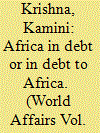

|
|
|
| 2 |
ID:
117464
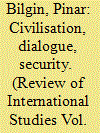

|
|
|
|
|
| Publication |
2012.
|
| Summary/Abstract |
The purposes of this article are twofold: (1) to consider the extent to which Dialogue of Civilisations (DoC) initiatives, as alternative visions of post-secular world order, are likely to address insecurities that they identify; and (2) to point to other insecurities that are likely to remain unidentified and unaddressed in the process. In their present conception, DoC initiatives risk falling short of addressing the very insecurities they prioritise (the stability of inter-state order) let alone attending to those experienced by non-state referents, which they overlook. The article advances three points in three steps. First, I point to how projects of civilisational dialogue have bracketed civilisation, thereby leaving intact the Huntingtonian notion of civilisations as religiously unified autochthonous entities. Second, I argue that while contributing to opening up space for communication, DoC initiatives have nevertheless failed to employ a dialogical approach to dialogue between civilisations. Third, I tease out the notion of security underpinning DoC initiatives and argue that the proponents DoC, in their haste to avert a clash, have defined security narrowly as the absence of war between states belonging to different civilisations. Theirs is also a shallow notion of security insofar as it fails to capture the derivative character of security and insecurity.
|
|
|
|
|
|
|
|
|
|
|
|
|
|
|
|
| 3 |
ID:
089110
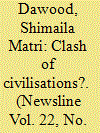

|
|
|
|
|
| Publication |
2009.
|
| Summary/Abstract |
Stranger to history is a difficult to review, perhaps because it is difficult to really understand what one should make of it.
|
|
|
|
|
|
|
|
|
|
|
|
|
|
|
|
| 4 |
ID:
057264
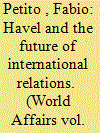

|
|
|
| 5 |
ID:
115888


|
|
|
|
|
| Publication |
2012.
|
| Summary/Abstract |
One of the most difficult tasks facing the foreign policy makers in India is the requirement to balance the relations with Iran while enhancing proximity with the United States. This invariably raises questions over the importance of Iran. An ancient civilisation, Iran is located at the crucial junction of South Asia and the Middle East. It also links the Central Asian Republics and the Caucasus region to the Arabian Sea. Historically, it has influenced its neighbours, irrespective of the type of government in power. One of the oldest continuously inhabited civilisations, it forms a bridge between the Semitic world and the Indo-Aryan civilisation of South Asia and has had strong historical linkages with India. This article looks at the strategic importance of Iran for India.
|
|
|
|
|
|
|
|
|
|
|
|
|
|
|
|
| 6 |
ID:
101751
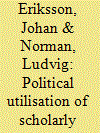

|
|
|
|
|
| Publication |
2011.
|
| Summary/Abstract |
his article discusses how and under what conditions ideas coming from International Relations (IR) scholarship are used in foreign policy. We argue that the focus on policy relevance, which dominates the IR literature on the research-policy interface, is limited. Focusing instead on political utilisation highlights types and mechanisms of political impact, which are overlooked in studies on policy relevance. The fruitfulness of this change in focus is showed in an analysis of how Samuel Huntington's 'clash of civilizations' notion and Joseph Nye's 'soft power' concept have been used in US foreign policy. George W. Bush's explicit critique and reframing of 'the clash' thesis should not be interpreted as absence of impact, but as a significant symbolic utilisation, which has helped legitimate US foreign policy. Likewise, in the few instances in which the notion of 'soft power' has been used explicitly, it has played a conceptual and symbolical rather than instrumental role. More generally, this article argues that accessible framing and paradigm compatibility are essential for political utilisation of ideas.
|
|
|
|
|
|
|
|
|
|
|
|
|
|
|
|
| 7 |
ID:
151203
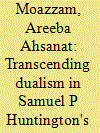

|
|
|
|
|
| Summary/Abstract |
Glorification of ‘self’ (Western civilisation) at the expense of the ‘other’ (eight civilisations) was inherent in Huntington’s Clash of Civilizations thesis. The ‘other’ civilisations identified—as the non-self and situated mostly in the Global South—were clubbed together as the Rest, irrespective of their pluralism. Building on Huntington’s binaries—the West and the Rest—this article makes an attempt to reflect on similarities within the perceived differences. Even though his civilisations appear different, they are in many ways similar due to interactions, colonisation and globalisation. Their relationship has become complicated; Western civilisation cannot do without civilisations from the Global South. Hence, there can be no perpetual or fixed enemy nor can all relationships be suspended with the ‘other’ in a globalising world.
|
|
|
|
|
|
|
|
|
|
|
|
|
|
|
|